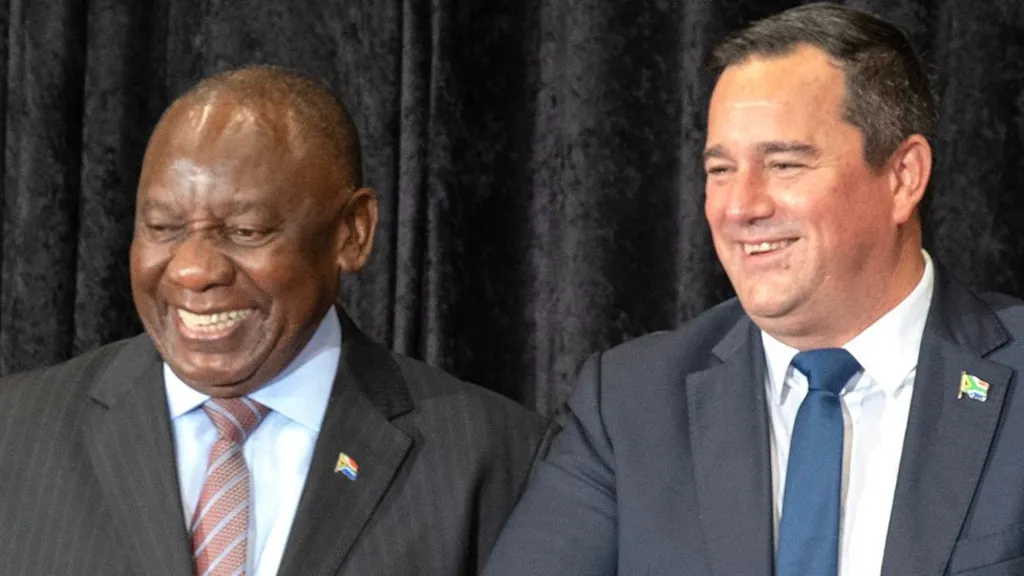Tensions Rise Over Education Reform in South Africa’s Unity Government
3 min read
South African President Cyril Ramaphosa has sought to ease tensions within his fragile coalition government by postponing the implementation of the most contentious part of a new education law. The move comes amid growing disputes over the language policy outlined in the Basic Education Laws Amendment (Bela) bill, which has the potential to destabilize the coalition formed after the African National Congress (ANC) lost its parliamentary majority in the recent elections.
At a public ceremony, Ramaphosa announced a three-month consultation period before signing the new measures into law. Despite this delay, John Steenhuisen, leader of the Democratic Alliance (DA), the coalition’s second-largest party, has reiterated plans to challenge the new law in court. Historically rivals, the ANC and DA now find themselves in a coalition government, and their discord over the Bela law highlights the fragile nature of their alliance.
Steenhuisen has expressed support for further dialogue but insists that any negotiations must safeguard the constitutional right to mother-tongue education, which he believes the reforms jeopardize. The president is urging all parties in the coalition to find ways to accommodate differing viewpoints.
Key Aspects of the Bela Law
The Bela law, enacted by the previous ANC-dominated parliament, introduces several significant reforms to South Africa’s education system:
- Government Regulation: The law mandates government control over school admissions and the language of instruction.
- Home Schooling Oversight: It introduces regulations for home schooling.
- Compulsory Schooling: Parents may face imprisonment if they fail to ensure their child attends school.
- Early Education: The law makes Grade R, for four- and five-year-olds, compulsory, advancing the start of formal education by a year.
- Corporal Punishment: It enforces a ban on corporal punishment with penalties including fines and possible jail time.
The ANC argues that these reforms are necessary to transform the education system and address persistent inequalities. According to experts, South Africa’s education system is in dire need of improvement. In 2021, it ranked last out of 57 countries in the Progress in International Reading Literacy Study, which assessed the reading abilities of 400,000 students worldwide.
Sources of Controversy
The most contentious aspect of the Bela law is its provision for increased government oversight over language and admission policies. This issue is particularly sensitive due to its implications for racial integration in education. The previous ANC government argued that language and admission criteria were being manipulated to limit access for the majority of learners, perpetuating inequalities from the apartheid era.
Although the legislation does not explicitly mention Afrikaans, the ANC has highlighted concerns that some children are being excluded from schools where Afrikaans, the language of the white-minority Afrikaners, is the medium of instruction. The DA, however, defends the right of school governing bodies to set their own language policies, citing constitutional protections for mother-tongue education.
Strong opposition has emerged from the Afrikaans-speaking community. Civil rights group AfriForum has denounced the bill as an attack on Afrikaans education and vowed to oppose it, arguing that it threatens the existence of Afrikaans schools and the quality of education they provide. The Freedom Front Plus, another coalition party representing Afrikaner interests, has labeled the Bela law as “ill-conceived,” asserting that it creates unnecessary uncertainty and disputes over established rights related to basic education.
Additionally, concerns have been raised about the reforms to home schooling. Many middle-class families currently use unregulated private schools due to the poor quality of state schools. The Bela bill aims to close the loophole allowing these schools to operate as “home learners” with informal “tuition,” bringing them under stricter government regulation.
Ramaphosa’s Response and Future Outlook
Ramaphosa’s decision to delay the implementation of the controversial language measure was intended to address the DA’s concerns and foster compromise. However, Steenhuisen remains dissatisfied, suggesting that the delay might be a tactic to quell opposition temporarily before proceeding with the reforms as planned.
Steenhuisen described the potential future implementation of the law as a “threat” to the coalition’s spirit and has vowed to continue legal challenges if necessary. Despite this, he maintains that policy disagreements do not necessarily spell the end of the coalition government.
With the three-month consultation period now underway, it remains to be seen whether a compromise can be reached or if the coalition will face further strife over the Bela law.






